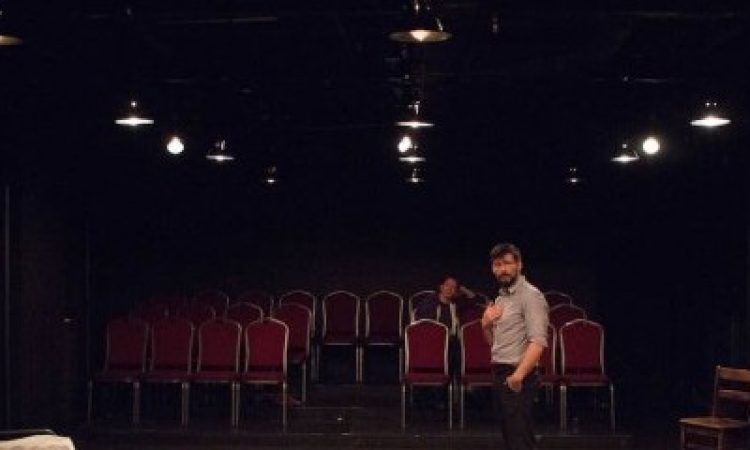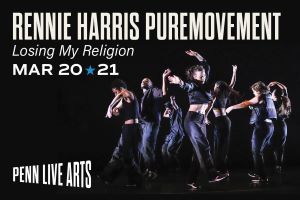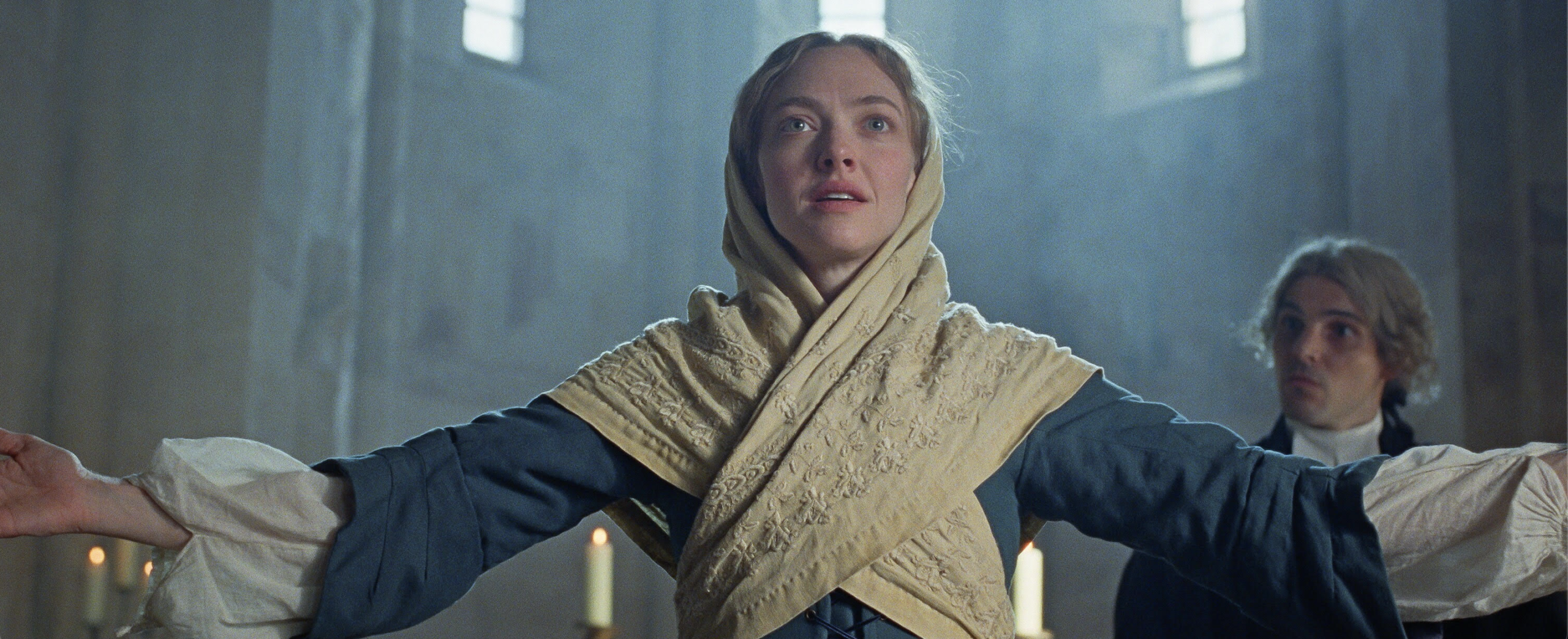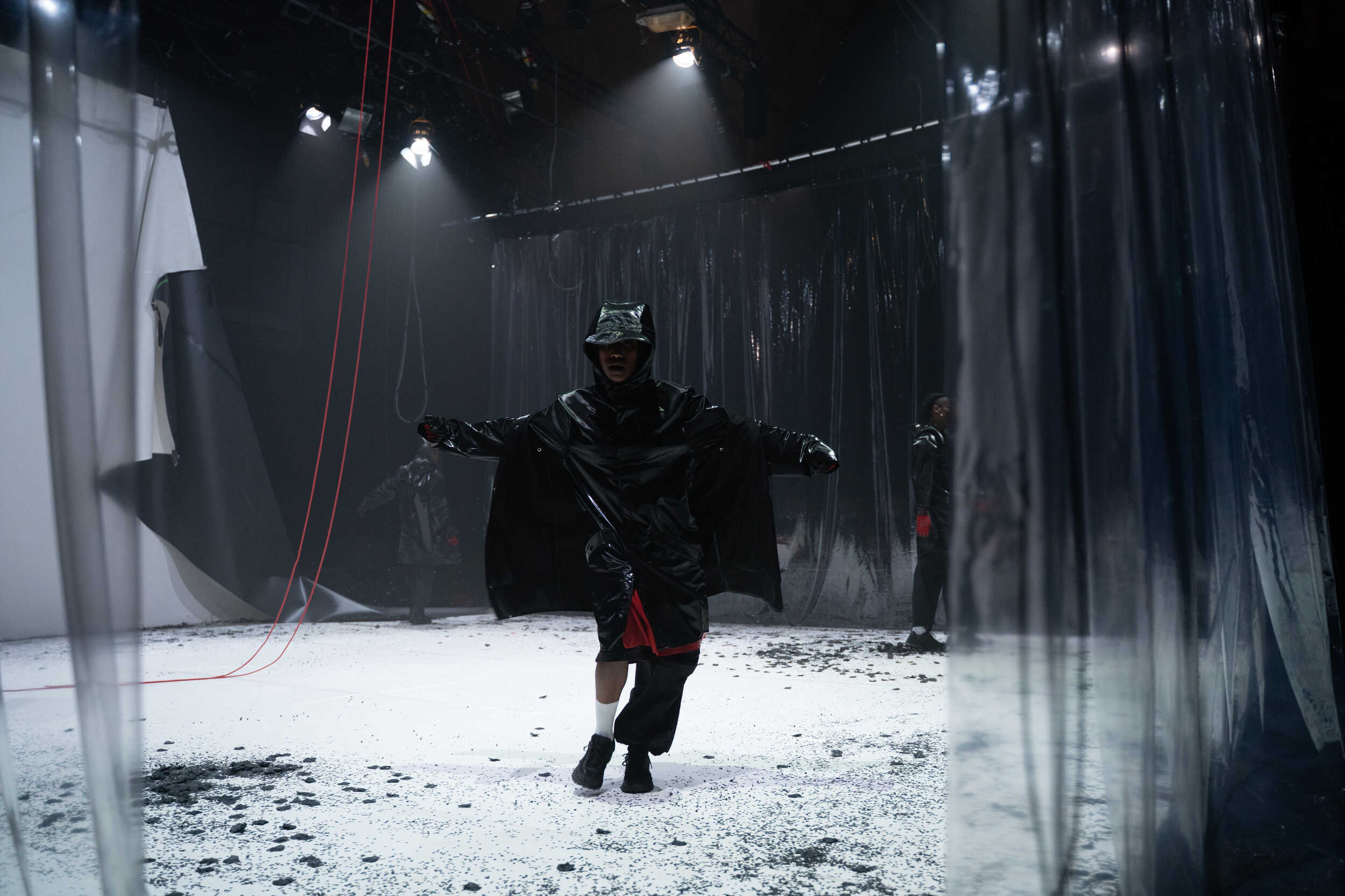Plays and Players’ Skinner Studio blackbox is set up with seats on either side of the playing space; we stare across into the eyes of other audience members. Amanda Jensen’s set design is simple: a wooden chair and an old cot with a green mat and a blanket, woolly and military-style.
Scott Rodrigue—all arresting gaze, disarming smile, and handlebar mustache—sells beer out of a cooler and weaves in and out of the seats, chatting comfortably with the audience. He’ll soon be launching into a 90-minute solo performance, and he’s taking no steps to separate himself from us, or to separate us from the reality of our presence in the theater.
Lights dim, the house music quits, and Rodrigue, sitting among the audience, says, “I’m traveling,” cutting across our chatter. The Fever, an Obie Award-winning play by Wallace Shawn, first performed in 1990, is ostensibly about a privileged white man who has picked up Marxism osmotically from his colleagues and accidentally from books. He’s traveled to poor countries to visit with poor people and see their lives, and then returned home to go to fancy parties. Today, he wakes up in a hotel room with a terrible fever and goes to the toilet to throw up.
This narrative is a light veil thrown over Shawn’s main point: a debate about privilege, civil rights, and accountability. As the traveler pukes into the toilet, his assaulted mind attacks his own hypocritical justifications of his luxury and relative wealth.
Yes, you think—there’s money in your purse—you’ll give her some of it. And a voice says—Why not all of it? Why not give her all that you have? Be careful, that’s a question that could poison your life. Your love of beauty could actually kill you. If you hear that question, it means you’re sick.
Rodrigue intentionally chooses accusation and direct address again and again throughout the piece, only dipping into his own subjectivity—into performance of the “fever”—from time to time.
I have collaborated with Scott Rodrigue on three projects, and taken a series of workshops he led on Grotowsky-based movement.* He describes Grotowsky training as being about channeling emotional experience through physical expression. In workshops, his dynamic physical energy and broad emotional and movement vocabulary are prominent.
This production features an emotionally and physically restrained Rodrigue. His movement is naturalistic, his delivery is highly rational and direct. The effect is not unlike Brecht’s “distancing effect” or “alienation”: performers can stand outside of character, deliver the lines, arguments, and story in a play. The desired effect is an audience who responds rationally, who watches, interprets, disagrees, and makes ethical decisions.
Grotowsky work is also about presence, about being in the space at the moment of performance, and responding to what’s actually happening. This play is at its strongest if the most dynamic performance is inside the head of the audience members, who are actually questioning their own actions, or grappling with the arguments Shawn is presenting.
The Fever is, ultimately, a critical map of the system of beliefs that justify the American class system. Shawn’s optic on this is hypocrisy. He does not stop at simply attacking hands-off liberals who vote every four years but don’t show up as activists or put themselves in harm’s way.
[T]he one they’re being executed for is you, just as it was always you that all those people were talking about so many years ago when they kept on saying, “For our children’s sake, we have to do it, we have to set this town on fire, this barn, this hospital, these forests, these animals, this rice, this honey,” just as it’s still you, because of how much you love those clean white sheets and the music and the dancers and the telephone calls, for whom all those people with radiant faces are being tortured tonight, are dying tonight.
In the end, The Fever is a defense of Jesus-like self-abasement, using the tool of reason. The play is a proposal by the performer, which the audience is left responsible for responding to.
The title is an ironic proposition. In literature and archaic psychology, fevers have often been connected with insanity or intense nervous excitement (as in the term brain fever), but the traveler’s “fever” is actually the attempt of his rational mind to bridge his leftist beliefs with his ready accumulation and acceptance of lower-middle-class wealth and luxury while the people he tries to champion continue to suffer.
Shawn stands back and argues that we are all in a state of insanity, that our liberalism is incompatible with our behavior, that our decision to keep the comparative wealth we work for, rather than sharing alike with those poorer than we are, is incompatible with any belief in equality.
The strength of this work lies in how stingy Rodrigue is with emotionality. He rationally makes Shawn’s arguments, letting the linguistic power of the text carry the performance, and suggesting that Brechtian distancing can still work: powerful theater can still take the form of a rational conversation.
The Fever, Scott Rodrigue, Plays & Players Theater, April 12 – April 22
*Rodrigue is also a writer for thINKingDANCE.
You can see playwright Wallace Shawn reading the entire text here:
Part 1 https://podcast.lannan.org/2010/05/05/wallace-shawn-reading-part-1-15-december-1999-video/
Part 2 https://podcast.lannan.org/2010/05/05/wallace-shawn-reading-part-2-15-december-1999-video/






